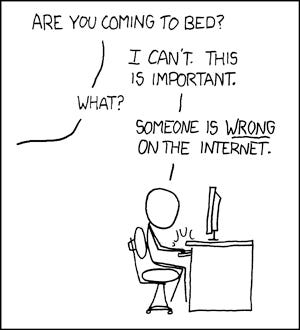Monday 3 October, 2022
How not to run a country
This week’s Economist cover
Quote of the Day
”Neurosis has an absolute genius for malingering. There is no illness that it cannot counterfeit perfectly.”
Marcel Proust, 1922
Musical alternative to the morning’s radio news
Keith Jarrett | Over the Rainbow (Tokyo 1984)
Long Read of the Day
Ark Head
I don’t know about you but I feel increasingly like the guy in the cartoon — except that my concern there’s something terribly wrong with our world, not just the Internet. The difficulty is that remedying any of the wicked problems that beset us lies way above my — or your — pay grade, and perhaps above anyone’s pay grade. And yet nobody writes about this, possibly because nobody wants to admit that we are locked in incompetent systems — ones that can’t fix themselves.
All of which is by way of explaining why I thought this little essay by Venkatash Rao is so interesting. He sees the same enervating dilemma, but has an interesting take on our primary coping mechanism — the (Noah’s) Ark mentality.
We increasingly respond practically to the world without even attempting to make sense of it.
One mental model for this condition is what I call ark head, as in Noah’s Ark. We’ve given up on the prospect of actually solving or managing most of the snowballing global problems and crises we’re hurtling towards. Or even meaningfully comprehending the gestalt. We’ve accepted that some large fraction of those problems will go unsolved and unmanaged, and result in a drastic but unevenly distributed reduction in quality of life for most of humanity over the next few decades. We’ve concluded that the rational response is to restrict our concerns to a small subset of local reality–an ark–and compete for a shrinking set of resources with others doing the same. We’re content to find and inhabit just one zone of positivity, large enough for ourselves and some friends. We cross our fingers and hope our little ark is outside the fallout radius of the next unmanaged crisis, whether it is a nuclear attack, aliens landing, a big hurricane, or (here in California), a big wildfire or earthquake.
We’ve concluded the flood cannot be stopped, and we’re building arks to retreat to…
Marvellous, thoughtful piece.
Putin’s latest frightening gambit lies at the bottom of the ocean
Yesterday’s Observer column:
The strange thing about Putin’s assault on Ukraine was that he clearly hadn’t consulted Valery Gerasimov, the guy who in 2013 had radically reconfigured Russian military doctrine at his behest (and is now chief of the Russian armed forces). Gerasimov’s big idea was that warfare in a networked age should combine the traditional kinetic stuff with political, economic, informational, humanitarian and other non-military activities. This would mean, for example, that before firing a shot, you should first use social media and other network tools to misinform, confuse, polarise and demoralise the population of your adversary. In that way, democratic regimes would find it more difficult to motivate their citizens for combat.
Putin’s invasion in February ran directly counter to this doctrine; perhaps Gerasimov was not part of the inner circle of trusted cronies on whom Putin initially relied. Instead the assault was a 1940s-style blitzkrieg, except in Technicolor rather than black and white. And it hasn’t worked. So as he returns to the drawing board, it’s conceivable that the Russian leader has, finally, been talking to Gerasimov. If that’s the case, then their conversations will have rapidly turned to topics such as deniability, asymmetric warfare and identifying the critical weaknesses of their western adversaries.
Which in turn means that they will be thinking less about pipelines and much more about the undersea fibre-optic cables that now constitute the nervous system of our networked world. ..




